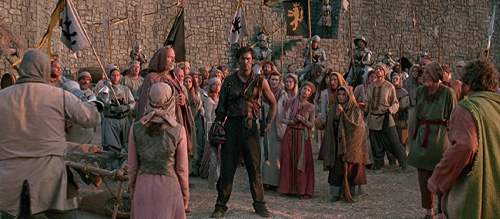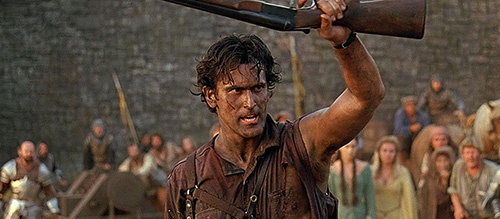‘Army of Darkness’ at 30 – Review

Army of Darkness (1992)
Director: Sam Raimi
Screenwriter: Sam Raimi, Ivan Raimi
Starring: Bruce Campbell, Embeth Davidtz, Marcus Gilbert, Ian Abercrombie, Richard Grove, Bridget Fonda, Ted Raimi
The Evil Dead films, led by Sam Raimi’s directorial ingenuity and complimented by Bruce Campbell’s legendary performances as Ash Williams, make up one of the most original horror trilogies in cinema history. The series’ ability to balance horror and suspense with comedic timing has paved the way for self-aware franchises like Scream, and has made Sam Raimi as close to a household name as any contemporary filmmaker. Over the decade-plus in which the would-be director of Spider-Man helmed Evil Dead (1981-1993), the resourceful filmmaker took horror in new directions and established new filmmaking techniques, the trilogy’s end-point – 1993’s Army of Darkness (also known as Evil Dead III: Medevil Dead) – being as far removed from the first two films as possible, whilst still being a celebration of Raimi’s unique directorial style. Army of Darkness is an over the top, campy, fever dream of a comedy film that could only work with a director as fearless as Sam Raimi and a character as ridiculous yet charming as Ash Williams.
The moronic, chainsaw-armed, shotgun-waving, S-Mart employee Ash (Campbell) has once again found himself subject to the curses of the Necronomicon and it’s more ridiculous than ever before….
The book of the dead transports Ash and his ‘73 Oldsmobile Delta to 1300 AD in the middle of an altercation between King Arthur and Duke Henry the Red. Despite his pleas for their understanding, Ash is captured and enslaved by Arthur’s men and accused of being a spy for Henry’s army. Soon after, he is put to the test by the people of the castle and eventually proves himself to be the prophesied “chosen one’ who’s come to save them from the fight against the Deadites. He reluctantly agrees to assist after ensuring safe passage back to his own time, which leads him down a road of wacky hijinks that are impossible to predict. Unsurprisingly, as he journeys on, Ash’s own buffoonery unleashes an army of Deadites upon King Arthur’s kingdom and he must fulfil his new duty as the savior to the people.
This ridiculous plot is the perfect playground for filmmaking creativity, exemplified in a scene in which Ash is led to a windmill (followed by Raimi’s now iconic shaky-cam technique) by the Necronomicon’s curse and tormented by a bunch of mini-Ashes. The goofs go back and forth for quite some time, both versions of Ash engaging in Charlie Chaplin-esque gags. At one point, a mini-Ash jumps into regular Ash’s mouth, so the hero chases the dive with boiling hot water, delivering one of the many unreal one liners of this film: “How about some hot chocolate, huh?” The entire scene feels straight out of a ‘Looney Tunes’ episode, which is a dramatic shift from the NC-17 gore overload that was the series’ freshman attempt.

Army of Darkness’ predecessors balanced horror and comedy with favor to the former, but this film breaks entirely new ground by completely embracing the campiness of the series with barely any horror left to latch onto. While there are still moments of spurting blood, dismembered Deadites, and gruesome fight scenes, Army of Darkness is closer to Monty Python and the Holy Grail (1975) than The Exorcist (1973). The unhinged bookend to the Evil Dead series is downright hilarious in all of its ridiculousness and excels as an homage to slapstick comedy and exciting camerawork.
As fun and energetic Army of Darkness is, its overall story lacks the plot togetherness of Evil Dead II (1987) and suffers from uneven pacing that pulls you through various Ash shenanigans without a moment to digest what has just been on screen before the camera whacks your perspective and the story in an entirely different direction. However, Bruce Campbell’s undeniable charisma and screen presence makes it impossible to gripe for too long.
The Raimi and Campbell duo met in high school making films together and have stayed friends ever since. This long-standing connection between them as creatives and friends is palpable, with Campbell’s performance being the showcase of an actor truly comfortable in his own environment. It’s evident there is excitement behind the camera as well. Each shot is constructed with intention and stretched to its absolute potential; it’s as if Raimi had a creative vetting process for each scene where he’d put his screenplay to the test to see how far he could take it.
At the time of its release many fans were shocked at the tonal flip the film took, and many audiences were confused with Ash’s characterization (which was largely due to the extensive cuts made to the runtime of the theatrical cut of the film). Universal hacked Raimi’s 96-minute sequel down to 81 minutes and changed his original ending, with the studio calling it too much of a “downer”. Though the film’s original audience didn’t get to enjoy the fully realized product of Sam Raimi’s high-octane creativity until a decade later, the director’s cut of the film is now available in many forms, so you can enjoy another 30 years of this timeless gem.
Score: 19/24
Recommended for you: 10 Best Sam Raimi Movie Moments
Written by Kae M.
You can support Kae M. on Twitter – @ultraman1312

